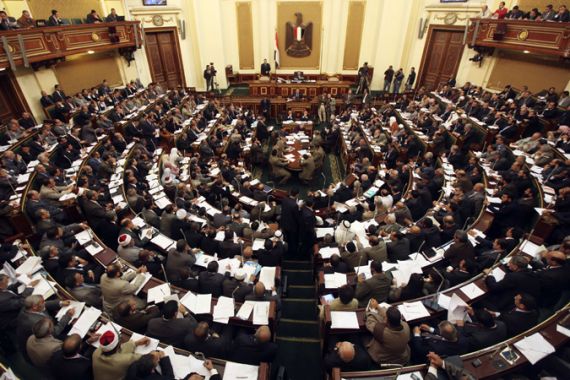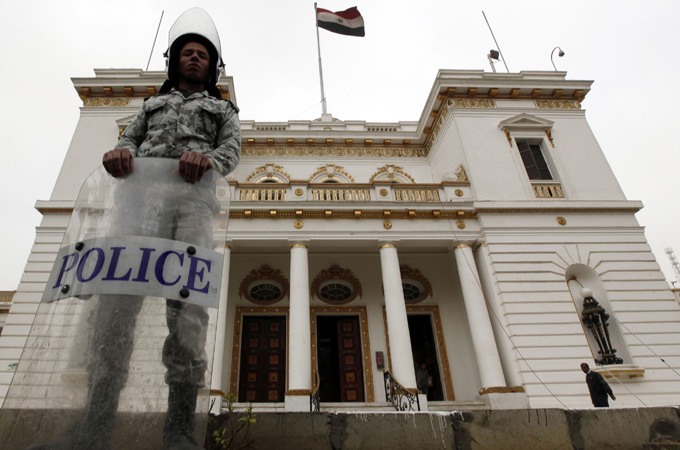Egypt MPs in no-trust motion against govt
MPs seek to replace the military-appointed government by a coalition that mirrors the makeup of the legislature.

 |
| The move will pile pressure on the ruling generals to appoint a new cabinet led by the Muslim Brotherhood [Reuters] |
Egypt’s parliament has voted to begin steps to withdraw confidence from the military-appointed government.
The move on Sunday will pile pressure on the ruling generals to appoint a new cabinet led by the Muslim Brotherhood.
A vote of no-confidence would take Egypt into new political waters and could set the stage for a confrontation if the generals, who assumed power after the overthrow of Hosni Mubarak last year, refuse to yield to the will of a parliament elected in the country’s most democratic vote in six decades.
It could also complicate negotiations with the International Monetary Fund over a $3.2bn loan that the government of Prime Minister Kamal al-Ganzouri is seeking to stave off – a looming financial crisis after more than a year of political and economic turmoil.
MPs heaped criticism on the government during a session called to debate its handling of a probe into civil society groups and its decision to lift travel bans imposed on foreigners, including Americans, charged in the case.
MPs have also criticised the government for its handling of riots after a soccer match in Port Said on February 1 that left 73 dead and for the broader economic problems facing the country of 80 million.
Saad al-Katatni, the parliament speaker, a member of the Muslim Brotherhood’s Freedom and Justice Party (FJP), asked MPs to vote on the idea of moving to withdraw confidence from the government, after one MP after another called for its resignation.
In a show of hands during the televised session attended by government ministers, almost every MP voted in favour of the motion. “The chamber agreed,” Katatni said after the vote.
The government ministers who attended the early session did not return for a later one, prompting Katatni to adjourn proceedings. He warned the government against hindering parliament’s work.
“It appears that the government wants to start a crisis with the parliament,” he said. “I will adjourn the session until the government attends tomorrow. If it doesn’t show up, parliament will have a bone to pick with them,” he said.
‘Sack the government’
According to Egypt’s system of government, only the military council has the right to discharge and appoint cabinets.
But, the Brotherhood, which has 43 per cent of the seats in parliament, has argued that the country is in a new era and the government should either resign or be sacked if it loses the confidence of parliament.
Under Mubarak, parliament was little more than a rubber stamp for decisions passed down from on high.
The more assertive role played by parliament since the legislative election is one measure of change in Egypt since Mubarak was ousted.
Saad Al-Hoseiny, a parliamentarian from the FJP, told Sunday’s session: “The government that can’t run the country’s affairs has to leave. There is no way but for the government to leave,” he said.
“Sack the government, sack the government,” Hatem Azzam, a member of the liberal Hadara Party, called out from his seat.
Farid Ismail, an FJP MP, said the vote would be “a public declaration that the government isn’t accepted by the street”. “We will continue escalating until the military council responds,” he told Reuters.
It was not immediately clear when the vote of no-confidence would take place.
The decision to lift the travel ban on the 16 foreigners charged with receiving illegal foreign funds and pursuing their pro-democracy activities without a license was widely seen in Egypt as a humiliating submission to US pressure.
The Egyptian authorities say it was a judicial decision.
Mustapha al-Sayyid, a political science professor at Cairo University, doubted the military council would sack the Ganzouri government with only a few months left before it was due to leave office.
But Ganzouri might resign, he said.
The Ganzouri government is due to leave office at the end of June, the same time as the military is due to hand power to an elected president.
“If the (military council) accepts this, then it will be its first defeat in face of popular power,” he said.